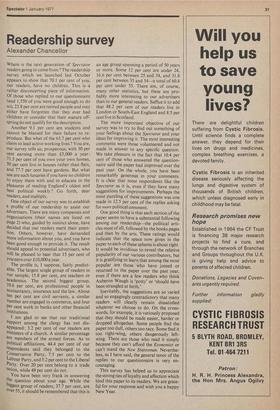Readership survey
Alexander Chancellor
Where is the next generation of Spectator readers going to come from ? The readership survey which we launched last October appears to show that 70.1 per cent of you, our readers, have no children. This is a rather disconcerting piece of information. Of those who replied to our questionnaire (and 1,550 of you were good enough to do so), 23.8 per cent are retired people and may either have forgotten that they ever had children or consider that their mature offspring do not qualify for the description.
Another 9.1 per cent are students and cannot be blamed for their failure to reproduce. But what of the 63.7 per cent who claim to lead active working lives? You are, our survey tells us, prosperous, with 50 per cent earning more than £5,000 a year : 71.5 per cent of you own your own homes, 50 per cent live in houses rather than flats, and 77.7 per cent have gardens. But what use are such luxuries if you have no children to enjoy them with and to educate in the Pleasures of reading England's oldest and best political weekly ? Go forth, dear readers, and multiply.
One object of our survey was to establish a profile of our readership to assist our advertisers. There are many companies and organisations (their names are listed on Page 2) who, guided by instinct alone, have decided that our readers merit their attention. Others, however, have demanded more information about you, and you have been good enough to provide it. The result Should appeal to potential advertisers, who Will be pleased to hear that 15 per cent of You earn over £1 0,000 a year.
The profile is, I suppose, fairly predictable. The largest single group of readers in our sample, 15.8 per cent, are teachers or academics. The second biggest group, 10.6 per cent, are professional people in accountancy, insurance and the law. About ten per cent are civil servants, a similar number are engaged in commerce, and four Per cent work in banks and other financial institutions.
1 am glad to see that our traditional support among the clergy has not disappeared: 3.2 per cent of our readers are Ministers of a church. A similar percentage are members of the armed forces. As to Political affiliations, 44.4 per cent of our respondents said they belonged to the Conservative Party, 7.5 per cent to the Labour Party, and 5.2 per cent to the Liberal Party. Over 20 per cent belong to a trade union, while 49 per cent do not.
You have been very frank in answering the question about your age. While the biggest group of readers, 37.7 per cent, are Over 55, it should be remembered that this is an age group spanning a period of 50 years or more. Some 12 per cent are under 24, 16.6 per cent between 25 and 34, and 31.8 per cent between 35 and 54—a total of 60.4 per cent under 55. There are, of course, many other statistics, but these are probably more interesting to our advertisers than to our general readers. Suffice it to add that 48.2 per cent of our readers live in London or South-East England and 8.5 per cent live in Scotland.
The more important objective of our survey was to try to find out something of your feelings about the Spectator and your ideas for improving it. The most interesting comments were those volunteered and not made in answer to any specific question. We take pleasure in the fact that 10.4 per cent of those who answered the questionnaire said the paper had improved over the past year. On the whole, you have been remarkably generous in your comments. It is clear that most respondents like the Spectator as it is, even if they have many suggestions for improvements. Perhaps the most puzzling of these suggestions was one made in 12.5 per cent of the replies asking for more political comment.
One good thing is that each section of the paper seems to have a substantial following among our readership—the political articles most of all, followed by the books pages and then by the arts. These ratings would indicate that the space now given in the paper to each of these spheres is about right. It would be invidious to reveal the relative popularity of our various contributors, but it is gratifying to learn that among the most popular are those who have joined or returned to the paper over the past year, even if there are a few readers who think Auberon Waugh is 'potty' or 'should have been strangled at birth.'
Inevitably, the suggestions are so varied and so engagingly contradictory that many readers will clearly remain dissatisfied whatever we choose to do. On the crosswords, for example, it is variously proposed that they should be made easier, harder or dropped altogether. Some people find the paper too dull, others too racy. Some find it too right-wing, others dangerously leftwing. There are those who read it simply because they can't afford the Economist or can't stand the New Statesman. Nevertheless, as I have said, the general tenor of the replies to our questionnaire is very encouraging.
This survey has helped us to appreciate the strong ties of loyalty and affection which bind this paper to its readers. We are grateful for your response and wish you a happy New Year.






















































 Previous page
Previous page